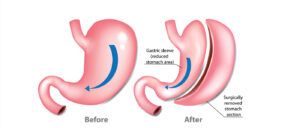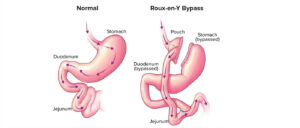Lose Weight with Bariatric Surgery
If you are considering weight loss surgery. Baptist Health can guide you to a lasting solution. As a resource across Arkansas, we’re prepared to assist you before, during, and after your procedure for optimal results.
Start your weight loss journey today!
Discover the Benefits of Robotic-Assisted Surgery

The da Vinci surgery offers enhanced precision for a wide range of procedures and provides an unmatched 3D, high-definition view of the surgical area, leading to increased accuracy, less pain, faster recovery, and a shorter hospital stay.
Baptist Health offers advanced bariatric robotic surgery using the da Vinci system, providing numerous benefits:
- Minimally Invasive: Smaller incisions lead to reduced scarring and a lower risk of infection.
- Enhanced Precision: The robotic system offers superior control, allowing for meticulous surgical techniques.
- Faster Recovery: Patients experience shorter hospital stays and quicker returns to daily activities.
- Less Pain: Reduced trauma to the body results in less postoperative discomfort.
Why Choose Robotic Bariatric Surgery?
Opt for robotic-assisted bariatric surgery at Baptist Health to ensure a safer, more efficient procedure with optimal outcomes. Our experienced surgeons leverage state-of-the-art technology to help you achieve your weight loss goals with minimal downtime.
Explore the transformative potential of bariatric robotic surgery. Contact us to learn more or schedule a consultation. Click Here
Learn more about the Baptist Health Bariatric Center.
Sleeve gastrectomy, also known as gastric sleeve surgery, is one of the most common procedures in bariatric surgery and is offered as one of Baptist Health’s weight loss surgery options. The gastric sleeve procedure is a safe way to shrink the stomach’s size, reduce appetite, and help eligible patients lose weight and keep it off for good.
In this procedure, a portion of the stomach is removed. The remaining stomach is shaped like a slender tube that significantly limits the amount of food consumed. This procedure is also performed laparoscopically (minimally invasive).
What Is a Sleeve Gastrectomy?
A sleeve gastrectomy is a form of weight loss surgery in which roughly 85% of the stomach is removed, leaving behind a small sleeve approximately the size and shape of a banana in its place. This procedure reduces the stomach’s capacity, adjusts hormones associated with hunger, restricts appetite, and helps patients feel fuller faster. Unlike a gastric bypass, there is no bypassing of the intestines, and the digestive system is left otherwise intact. As a laparoscopic procedure, patients often stay in the hospital for one to three days and adhere to a modified diet in the days and weeks following surgery.
How does a Sleeve Gastrectomy work?

With excessive food consumption over time, the stomach eventually stretches, becoming larger and larger. As overeating progresses, this process does too, leaving those affected with a virtual inability to feel full, even after dense or high-calorie meals. A gastric sleeve essentially corrects this process, immediately shrinking the stomach and removing the area that drives hunger hormones. When combined with a healthy diet and exercise, sleeve gastrectomy patients can expect to lose 60% to 70% of excess weight in the one to two years following surgery.
Who Can Get a Sleeve Gastrectomy?
While overall eligibility criteria will vary from patient to patient, most patients will have to meet the following qualifications:
- A BMI over 40, or a BMI over 35 in conjunction with weight-related health issues, like type two diabetes, heart disease, or hypertension
- A history of diet and exercise with limited success
- A willingness to commit to permanent lifestyle changes
- An ability to follow diet and exercise guidelines in preparation for surgery
- No health consequences that could impede successful surgery
In general, gastric sleeve surgery is used in one of two ways: as a stand-alone procedure to address obesity, or as the first step in a multi-phase weight-loss process for those with a BMI over 60. A sleeve gastrectomy is used in these patients to inspire initial weight loss, with a gastric bypass to follow in the future.
Gastric bypass surgery has long been a dependable option for those looking to lose weight, look better, and feel better. One of the weight loss surgery options offered by Baptist Health Bariatrics Center is the Roux-en-Y gastric bypass (or RYGB). RYGB has been changing lives, one surgery at a time, for decades. If you have been seeking a safe and effective way to lose weight, the Roux-en-Y gastric bypass surgery may be the right choice for you.
What Is a Gastric Bypass?
A gastric bypass is a form of bariatric surgery. In this procedure, the stomach is divided into one small and one large pouch. The small intestine is subsequently bypassed to restructure the digestive tract and facilitate lasting weight loss. We perform minimally invasive procedures whenever possible, working to minimize recovery and maximize effectiveness. Most patients go home two to three days after gastric bypass surgery.
How Does a Gastric Bypass Work?
A gastric bypass works by reducing the size of the stomach and restructuring the digestive tract. By reducing the size of the stomach, meals are significantly smaller. The digestive tract restructuring limits the absorption of the food eaten but also improves the function of gut hormones. This promotes the feeling of fullness, suppresses hunger and reverses the hormonal mechanism that causes type 2 diabetes in obesity. This leads to reduced calorie intake, food absorption, and improved hormones, thus, weight loss.

Gastric bypass procedures are often the first choice for our surgeons due to their high success rates and accelerated weight loss. Most patients lose 70% to 85% of excess weight in the first one to two years after surgery.
Life After Gastric Bypass
Gastric bypass is a highly reputed and sought-after surgery. Still, patients must be willing to commit to lifestyle changes after receiving the surgical intervention. Due to the digestive tract changes, gastric bypass patients will have to fully adhere to a new diet and lifestyle. Going back to old eating habits can lead to an uncomfortable phenomenon known as dumping, in which patients experience nausea, vomiting, diarrhea, and gastrointestinal distress. Further, these changes can lead to issues with vitamin and mineral absorption. Failing to take supplements as recommended by your doctor can lead to potentially dangerous deficiencies.
Start Your Weight Loss Journey
If you are considering weight loss surgery, Baptist Health is here for you. Contact us to learn more or schedule a consultation. Click Here
Learn more about the Baptist Health Bariatric Center.

